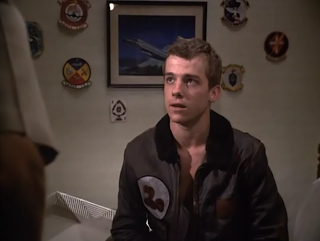Timothy Hutton won his Oscar from his only Oscar nomination so far for portraying Conrad Jarret in Ordinary People.
Ordinary People depicts the troubled lives of an upper middle class family after one of their sons has died and another son attempted suicide.
Timothy Hutton is not supporting to anyone in the film, and really is the lead in the film. Yes there is also Donald Sutherland, but he is merely also lead. His misplacement is especially clear if you compare his screen time to that of his co-nominee Judge Hirsch. This is an example of category misplacement that I do not mind all that much though, because of performance itself is one that is very much deserving.
Hutton has a unique character to play as he is a teenager who is given the focus of the film without it being some kids film, or some dumb comedy. Conrad Jarret is a unique character who Hutton brings fully to life with his performance. What really is so good about Hutton's performance is not only how raw emotionally his performance is, since he really does not hold anything bad really, but also how natural he is as well.
There never is a hint of Hutton acting throughout his entire performance which is incredible. Conrad is a character who goes all over the emotional scale from highs to lows, and everywhere in between. There is not a single emotion that Hutton fails to achieve in an entirely natural fashion. There is not a single calculated line, or feeling in this performance. Every emotion that Hutton conveys in this performance is absolutely honest.
Hutton never falls on the urge to play the part on one note of pain, or sadness. In fact in the dimensions of pain and sadness Hutton conveys a multitude of facets in his pain and sadness. But anyways Hutton also shows in many scenes his attempts to be able to attempt at least to return to his life before his suicide attempts, and his brother's death. Hutton never overplays this part, instead just showing him act like a normal young man in the circumstances, not overly special but still unique in his own way.
Many key moments showing his struggles though are with his psychiatrist (Judd Hirsch). These are difficult scenes, but Hutton never slips once. Hutton is utterly convincing in showing how deeply Conrad's troubles has wounded him, and made him desperately in need of help. Hutton never fails for a moment not to make Conrad's struggle exceedingly moving to watch, without ever seeming trying purposefully to make them so. His final meeting with Hirsch is especially moving it is a scene where Hutton covers a multitude of emotions and Hutton brings everyone to life, making this scene especially heartbreaking.
Pivotal moments in Hutton's performance come in his reactions with his parents with his cold mother Beth (Mary Tyler Moore) and his warm father Calvin (Donald Sutherland). In his scenes with his mother there is a distinct lack of chemistry the two have that is perfect for them. Their scenes together are frankly hard to watch, because of how cold and awkward they are to watch, both actors a brilliant though in bringing out this lack of connection, despite Hutton's showing an earnestness to try to make one.
On the opposite hand are his moments with his father. For most of the film they actually only share short moments together. Much of their time together is only a struggle, as Conrad attempts to convince his father of his mother's coldness. There is always a better understanding the two actors again achieve, even if more underlying until the very end of the film. Sutherland's and Hutton's final scene together though is just about perfect where the two finally come together showing how much they mean to each other.
Hutton performance is great here. He realizes the various aspects of his performance very effectively. There is not single false emotion that Hutton portrays in any scene in the entire film, despite the incredible challenge of the role. Every emotion, and every complex aspect of Conrad Hutton absolutely brings together into a fully realized character. Hutton never acts alone in his performance either, and always manages to find the right dynamic with his co-stars as well.














































